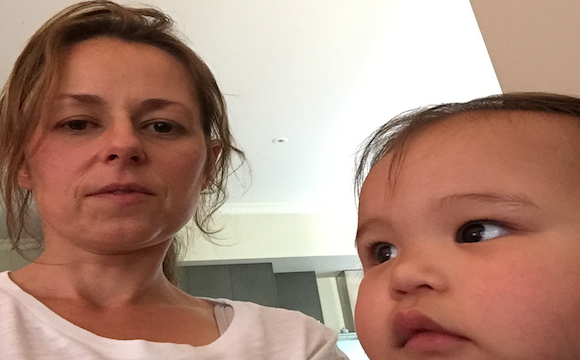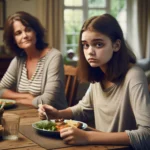A talk on body confidence in children hits home with mother

A talk on body confidence in children hits home with mother
It was like receiving a great big slap in the face. Sitting with my friend Lisa in an auditorium surrounded by a bunch of strangers, my mind was wondering, ‘Do they all know about me?’, ‘I wonder if any of them have an eating disorder?’ Instantly, my insecurities set in; I felt like a big neon sign was astride my head, flashing ‘Eating disorder right here, treat carefully’. Listening to Hannah Jarman from the Butterfly Foundation speak on a sensitive yet important topic, “body confidence in children and teens”, I began to understand with crystal clear clarity why, at age 41, I am who I am today.
I began to understand why my life has been a great big dark struggle of living secretly in my own world with a vicious eating disorder and an unforgiving case of body dysmorphia that tears my appearance apart to this very day. I was there to learn tips on how I could help my two young daughters feel good about themselves, but found I was learning about myself as well.
The speakers helped to shed light on why I’ve lived my entire life hiding behind a mask, not just any mask but a very misleading mask of well-being followed by the shocking realization that this has been my mask since childhood. Sadly, for my ‘little me’, this need not have been the case. If early intervention had been available, this may have eradicated or reduced the symptoms I’ve lived with for my whole life. Today, I feel sorry for that little girl who was me, needlessly living in silence and fear as the world passed her by.
I was in an eating disorder (ED) environment from a very young age (six through to adolescence). My mum had Anorexia Nervosa, and her ED nearly took her life. I remember the illness impact clearly; the skin and bones, the hospitals and the treatments. It made the lives of everyone around her a constant struggle, a struggle to keep her happy; she was like grenade, ready to explode at any moment and that scared me, terrified me. For me, such events would pave the way for a life of pretending, a life of trying desperately to be unseen and unheard, a life of not wanting to upset my mother, which would soon expand to not upsetting anyone at all.
This is where my very own ED stepped into the picture; at age six, ED became my protector, giving me somewhere to turn without burdening anyone around me, especially my mother. How did ED do this? He encouraged me to eat in order to self-soothe and to experience all those happy feelings inside that others take for granted, he was my friend, he would look after me when no-one else could and he did these things very well, for a short time anyway, until he started to change and turn on me, putting me down and making feel like I was a disgusting no-body.
So, as I sat here listening to Hannah and reading the screenshots, absorbing the information the reality of what she was telling us about Eds – answering the how, why and what questions — and it suddenly dawned on me that the person, the symptoms, the life that Hannah was describing was identical to mine, as a child, and to this very day. This lightbulb moment made me wonder, ‘has she put this presentation together to reflect my own life?’
Of course, I knew this was impossible, I’d never met Hannah until now, but how did she know so much about me? The answer to that was straightforward. While everyone with an ED has their own unique experience, the thoughts and behaviors of the disease are very much the same. The illness thrives on the individual’s self-perceived imperfections and proceeds to tear them apart:
* ‘why did you do that?
‘you don’t deserve to have friends’
‘no one wants to be around you’
… and so on, until the ED has pushed you so far that you have little choice but to retreat into a world that consists solely of you and your ED. The ED, of course, continues to claim to be your protector, providing you with a refuge from the opinion of others and ultimately, your very own healthy mind that is now so weak, it has little strength to stand up for you.
It wouldn’t be unreasonable to wonder if I had learnt anything new about Eds at this information evening. I mean, I knew it so well, I felt I could have written the whole presentation myself! When I left the presentation to go home, I felt disappointment deep within my body, thinking ‘that was a waste of time’, but I soon came to see that it had enabled me to see into the eye of my own ED, something I’d not been able to do until now.
The numerous messages my team of doctors, psychologists and even my mentor, June Alexander, had been telling me all along suddenly began to make a little sense. I began to see and understand myself a little better; how and why I had become the person I am today, and why this was not my fault or something to be hiding from the world in shame.
I am more able to accept and appreciate that there are many people like me, existing through life in a constant state of fear and silence, too ashamed to come forward for help. The good news is, that today, with early intervention, much of the struggle I’ve lived with can be avoided or minimalized. EDs follow a pattern, regardless of whether it is Anorexia, Bulimia, Binge Eating Disorder, or other forms, the suffering and torture within the mind is similar; fear, guilt, shame and an endless supply of unforgiving thoughts can lead to years of hiding or wanting to appear to be okay, just as my mother, June and many other older women had to do because there was no help for too many years.
The good news is that help is available today. Knowledge is power. I will draw on this knowledge in raising my my daughters, whom I will fight to protect from this horrible, life-destroying illness, and in my daily living generally. These are some of the key truths that will guide me:
- If in doubt, get help. Early intervention can make prevention and recovery very possible, don’t wait. I wish more information and help had been available when I needed it the most.
- Lead by example, take the focus away from shape and size and focus on a person’s character or the amazing things our bodies allow us to do every day. Comments regarding another people’s appearance are not helpful and can lead to further unhelpful behaviours; comparing self to others.
- Always use age appropriate responses and never shut down a conversation. Make time to explore your child’s thoughts and feelings, encourage open communication, they can tell you a lot about what’s going on and next time when faced with emotional difficulties, they’re more likely to feel comfortable and seek your support and advice.
- Always consider, ‘how would I feel if my child said this about themselves?’ when commenting about self-appearance or the appearance of others. Also, keep this in mind when it comes to seemingly harmless ‘teasing’ or body related comments at home; they are more damaging than you think, this I know from experience.
- Food is just food; it is neither good nor bad. A little bit of everything leads to a much happier and balanced life. Demonising foods only leads to shame and guilt which can nearly impossible to reverse. Shame and guilt are exactly what people with or at risk of an ED need less of.
- Find an activity that helps your child to feel good and that they enjoy; not only is it good to have interests, it is very helpful in taking focus away from food, body and weight. I can attest to this, having recently discovered photography. Already, I feel less focused on my ED and more excited about where this new skill is taking me. The possibilities in life have suddenly opened up for me and this is exciting.
For help or more information:
If you or anyone you know is experiencing an eating disorder, we encourage you to reach out for support. You can contact the Butterfly National Helpline: 1800 ED HOPE (1800 33 4673).





